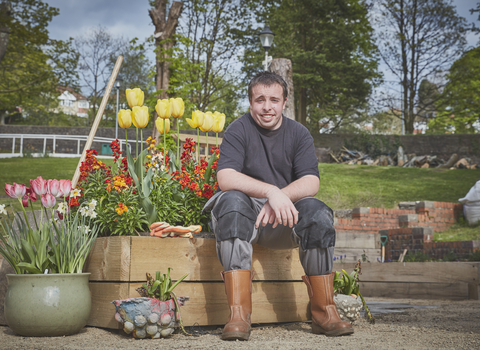Practical tips for cross-cultural communication
Welcome to English helps newcomers to Hull (mostly refugees and asylum seekers) to learn English, make new friends and find out about living in Hull, through community participation. Photo Copyright Karen van Diesen / 2024
Working with people from different cultural backgrounds can be interesting, rewarding and challenging
Have a look at these top tips. It’s not an exhaustive list, but we hope it gives you a starting point. But remember! This document tends towards generalisations – but people are not all the same, even if they share similar cultural backgrounds. Listen, always, to the individual. Don’t get bogged down in “rules”. Respond with warmth to the everyday human in everyone that you meet.
Welcome to English (https://www.youtube.com/watch?v=EwjRRdgO8zQ)
Community organisers at the Yorkshire Wildlife Trust have worked with the CIC, Welcome to English which helps newcomers to Hull (mostly refugees and asylum seekers) to learn English, make new friends and find out about living in Hull, through community participation. The group bring many people together from wide-ranging backgrounds so cross-cultural communication is very important to their work.
Showing respect; eye contact, smiling and body language
In many Western cultures, it’s considered polite to make eye contact with the person you’re talking with – although do remember that autistic and neurodivergent people can often struggle with this, too, and may make no eye contact or a lot.
However, in some cultures, eye contact, particularly between genders, is different. A traditional man from some Muslim communities may prefer to lower his gaze when speaking with a woman. This is not rudeness, but in fact how he is showing respect. This doesn’t apply to all Muslim communities.
Smiling is another feature that is prevalent in some Western European countries. However, in Eastern Europe, a smiling stranger can be viewed with suspicion. It is not that someone from an Eastern European country is unfriendly – far from it – but they often see no reason to smile with someone they don’t know. Smiling, to be sincere, ought to be for those you know and care about. This can lead to the incorrect stereotype that some Eastern Europeans are cold, but this is not the case.
People’s ideas of personal space vary very widely even within countries and communities. It is best to be very aware of the non-verbal clues that you see when you’re speaking with someone. If they edge away a few inches every time you move forward – you’re invading their space – so stop. Some countries are very physical and you may be poked or prodded by people; others tend to keep everyone at arms’ length. Be alert to these differences, and don’t be tempted to draw conclusions about someone’s character just from these differences. For example, in India and some Middle Eastern countries, young men may hold hands – this is a common expression of friendship and does not imply a sexual relationship.
There are some nuances around body language, too. It is fairly well known that in Muslim communities, it’s common to eat with your right hand; but if you’re at a party and you pick up a samosa with your left hand, no one will be offended.
Do your homework
If you know the predominate cultural backgrounds of the group(s) you’re going to deal with, then do some online searching before you meet. However, don’t get too tied up in what’s “right” and what’s “wrong.” Instead, it’s much better for personal relationships if you simply go in and listen. Observe. Ask questions. A respectfully-phrased question, asked in a genuine spirit of enquiry, will usually be welcomed.
Be alert, however: there are some questions that people from diverse backgrounds are very tired of hearing. “Where are you from?” can be a rather rude question for a white person to ask of someone who is Black who has a strong local accent. It is clear where they are from. When you are asking that question, what do you really mean? Are you asking about their heritage, and if so, is that a relevant question to what you’re doing that day? The reason this question is problematic – though it seems so small – is because it sends a signal to the other person that they are not “from here”, that they are “othered”. These constant questions over a person’s life can build up and make people feel excluded from their own country.
So yes, do ask questions, but only relevant ones – and do not be upset if someone does not want to answer them. A white English person speaking to a British Pakistani person and asking about Eid is fine, but that person is not speaking for all British Pakistanis, and cannot be expected to “educate” everyone all the time. Respect boundaries.
Don’t make sweeping assumptions and generalisations. This is why although it’s good to do some research, it’s far more important to listen and observe your particular group of people. Get to know the people in front of you – not the people you think you’re working with.
An important question to ask is about names. While in the UK, we are moving towards more informal ways of talking to people, using their first names, many people do not like it. Older people may prefer to be “Mr” or “Mrs”. Different languages deal with names differently – the first name you see might be a family name, for example. Simply ask what people want to be called. This is important for pronouns, too. You can offer your own name and pronoun first, then that automatically invites the other person to tell you theirs.
Communication across languages
There are around 300 languages spoken in the UK. Some of these are spoken as second languages by people, and for others, especially recent immigrants, they are first languages.
Remember that people can have different levels of skill in English. They might find it easier to read plain English than understand the spoken word, because it gives them time to work out what is being communicated. Other people have learned English by ear and will struggle with printed text. Some people will understand more than they can speak or write. Also, do not assume that people can read in their primary language. It is also common for the children of immigrants to be able to understand their heritage language but struggle to speak or write it.
Don’t feel intimidated by hearing different languages spoken around you! Some people will be translating for others, or even taking what you’ve said and repeating it to themselves in their primary language to help them remember.
You can help people understand what you’re saying with these hints (but remember these are generalisations):
- Slow your speech down a little but don’t do an exaggerated pause after each word. Much of what we understand comes down to the pattern and stress of a sentence, and some sentences are very familiar in their pattern – but a non-native speaker won’t understand each word sounded out individually.
- Try to keep one main idea for each sentence. Instead of pausing between words, pause a little between sentences so people can repeat it to themselves if they need to.
- Don’t make jokes. Humour is very hard to translate.
- Also avoid idioms, slang and figures of speech, as they don’t translate well at all. For example, “At the end of the day, we should look into this…” You don’t really mean you’ll physically look into something at 6pm, do you? “Popular? They were going like hot potatoes” and “they were having a right barney so I slipped off for a butty and a brew” are also pretty hard to understand.
- Some cultures see interruptions and loud debate as part of the conversation. Other cultures, such as Chinese ones, expect silences and welcome them as a way of showing respect, as it shows the listening is taking time to consider what the speaker has said. Once again, be alert to differences and don’t assume it’s rudeness.

The Wildlife Trusts
Have you been part of a community nature project?
We'd love to hear from you! Your experiences will be shared right here on the Community Hub and will inspire others to take action in their own neighbourhoods.
Except where noted and excluding images, company and organisation logos, this work is shared under a Creative Commons Attribution 4.0 (CC BY 4.0) Licence.
Please attribute as: “Nextdoor Nature (2022-2024) by The Wildlife Trusts funded by The National Lottery Heritage Fund, licensed under CC BY 40”





